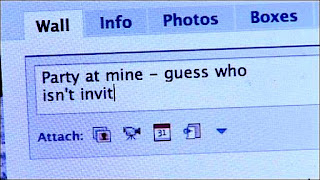The risks of Facebook (FB) include children sending bullying
messages, posting labelled photographs of themselves and their friends, and of
course strangers making contact with them.
First of all, be careful. How do you know they are using it?
Have you searched for your pupils online? If so, who authorised you to do that?
Obviously, the point I am making is that what for you is an act of concern, is for
another person an act of interference in what should be a matter between child and
parent (and maybe for another person what you did was just short of stalking).
Secondly, if your aim is to get these illicit users off FB, you
won’t win. If children are using FB they will not stop because their teacher said
so, and telling them to close their accounts will result in less respect for you.
Bear in mind that although the children will have lied about their age to FB, this
of itself is not in breach of any UK law, and they may have done it with the support
of their parents.
Deletion of accounts is not likely to be an option. Anyone
finding a Facebook page belonging to a child under 13 is encouraged by FB to
report it, and FB will then remove the account. However a teacher is on
uncertain ground in making such a report, and in any case a child can set up another
account immediately.
I'd suggest the following three-pronged approach.
1) Inform parents that the school advises that children not
be allowed to have FB accounts. The school will be unable to support in the event that a
child who has such an account, in contravention of FB and school regulations, is
bullied using this medium. Words to this effect could be part of your school cyber-bullying
policy.
3) While making
it clear that the school does not condone FB accounts, educate children in the risks
of having accounts completely open. Address the issue directly by making up an
imaginary child’s unprotected FB page and showing it on the board or handing
out as hard copy. Ask the children what they know about the owner of this
account, what the child likes, what they dislike, what their habits are, where they
‘hang out’. Through role play show how easy it would be for them to be fooled
into a meeting with a stranger. Hopefully this will shock them into adjusting
their privacy settings, but follow it up with a letter home anyway.
Follow @7000hours



No comments:
Post a Comment